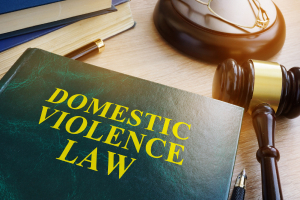Domestic violence charges alone won’t result in lengthy jail sentences. It’s the other charges that are attached to them.
Aggravated assault, physical abuse, felony battery, false imprisonment, rape, and stalking carry harsh penalties and often accompany domestic violence allegations. You could end up in jail or blocklist from your career.
Time works against you when you face domestic violence accusations. Do not delay! You need a criminal defense attorney to help you through this ordeal.
A Jacksonville domestic violence lawyer at Leon Law Firm is the advocate you need. We provide our clients with a vigorous and zealous defense that ensures the system treats you fairly. Our goal is to seek the best possible outcome for your case.
You Need an Experienced Jacksonville Domestic Violence Lawyer To Defend Your Rights Against Domestic Violence Accusations

These include:
- Knowledge of the criminal law system. The state and federal court systems often overwhelm laypeople. But we practically live there! We know criminal law and the court’s rules and procedures. Also, we worked with the prosecutors and judges before and know what to expect, which helps your case.
- Negotiation skills. Without an experienced attorney, prosecutors may stack charges or request sentences disproportionate to your offense. As your attorney, we can negotiate lesser charges or reduce your sentence. If we can show a prosecutor why the accusations are false, they may drop them!
- Support. Sometimes, the guidance includes emotional support. While attorneys are not mental health counselors, we deal with people facing embarrassment and depression over what’s happening to them. We can offer reality checks when necessary or be a listening ear.
- Expert witnesses. Attorneys have a network of experts. They include investigators, counselors, and forensic scientists. These individuals can help form your defense and add credibility.
These resources often prove vital in complex cases or those with few witnesses outside the victim and perpetrator.
Understanding the Domestic Violence Laws in Jacksonville, FL
Florida Law defines domestic violence as an assault, aggravated assault, battery, aggravated battery, sexual assault, sexual battery, stalking, aggravated stalking, kidnapping, false imprisonment, or any criminal offense committed by one family or household member to another. The violence must result in physical injury or death to consider prosecution.
Many people think of domestic violence as involving spouses or live-in partners. However, it includes anyone who lives together as a family or did so in the past. Also, parents with one child in common can face domestic violence charges even if they have never lived together or been married. There have been cases involving current or ex-roommates too.
Domestic violence charges also come with an injunction order. It restrains the accused from contacting the alleged victim. Any of the following actions violate the order:
- Remaining at a shared home;
- Being within 500 feet of the accuser’s residence, school, workplace, or any other place they regularly visit;
- Committing another violent act against the accuser;
- Threatening violence or harm;
- Calling, texting, emailing, or otherwise communicating with the accuser or attempting communication through a third party;
- Coming within 100 feet of the accuser’s car;
- Defacing or destroying the accuser’s personal property; and
- Refusing to surrender firearms or ammunition when ordered by the court.
Legal Penalties of Domestic Violence in Jacksonville, Florida
Violating the injunction is a misdemeanor in the first degree. It is punishable by up to one year in jail or probation and a $1,000 fine.
If convicted of domestic violence, you face a minimum of one year of probation. The court may also order you to attend a batterers’ intervention program. That program becomes a condition of your probation.
You may still receive a prison term if you intentionally caused harm. These minimum terms include:
- First offense: 10 days
- Second offense: 15 days
- Third and subsequent offense: 20 days
While these seem like light sentences, keep in mind that domestic violence also involves additional charges of assault, aggravated assault, battery, felony battery, aggravated battery, sexual assault, and others. These offenses range from second-degree misdemeanors to first-degree felonies.
That results in the following overall penalties going from most minor to most severe:
- Second-degree misdemeanor: Up to 60 days of jail and a fine of up to $500.
- First-degree misdemeanor: Up to one year in jail and a fine of up to $1,000.
- Third-degree felony: A prison sentence of up to 5 years and a fine of up to $5,000.
- Second-degree felony: A prison sentence of up to 15 years and a fine of up to $10,000.
- First-degree felony: A prison sentence of up to 30 years and a fine of up to $10,000.
Convictions may also include other restrictions, like required drug or alcohol treatment, restraining orders, domestic violence injunction, mental health counseling, community service, and relinquishing firearms.
Fortunately, there are defenses available to you.
Common Legal Defenses in Domestic Violence Cases
If convicted of domestic violence, the consequences expand beyond fines and jail sentences. It will affect any child custody and visitation proceedings, likely ending with you receiving supervised visitation only.
Some careers look poorly on domestic violence. You may face job loss or demotion. Finding new job opportunities with a violent offense on your record can be more difficult.
Active duty military or civilian law enforcement officers will see impacts on their job. Restricted duty, demotion, or termination can result.
So, getting all the facts and finding the best defense is essential. Here are the possibilities:
False Accusations

Another real challenge is a big one, false allegations. It takes a couple of forms: the incident didn’t occur as reported, or it was completely fabricated.
If you get falsely accused of domestic battery or abuse, one approach is to show your accuser had a motive for the allegations. These may include divorce, child custody, or infidelity. It often has to do with revenge or control.
Also, many false accusations contain inconsistencies. For example, the accused may have no physical marks backing the claims, or they claim the incident happened while they were at work or running an errand. Receipts and witnesses can provide testimony of those whereabouts.
Misidentification
This defense works if there is another perpetrator. For example, a neighbor thought you were assaulting your partner when it was another relative or even a stranger.
Misidentification is an unfortunate reality in the criminal justice system. According to the Innocence Project, misidentification influenced 64% of wrongful convictions in Florida. The finding influenced policy in law enforcement agencies to reduce the impacts of inaccurate eyewitness testimony.
Sometimes, expert witnesses or proof that you weren’t home at the time of the assault can support this defense.
Lack of Intent or Accidental

For example, your accuser may claim you pushed them down a flight of stairs. However, you may be able to prove it was an accident. For instance, you bumped them, or they slipped. If you tried to help them or call an ambulance, that could show you didn’t intend to hurt them.
Lack of intent also works with self-defense. Your intention wasn’t to hurt the other party but to protect yourself or others from their violent outburst. This theory is often difficult to prove unless the accuser has other factual inconsistencies in their claim, or you can come off as more credible with sufficient evidence.
Schedule a Consultation With Our Jacksonville Domestic Violence Lawyers Today













